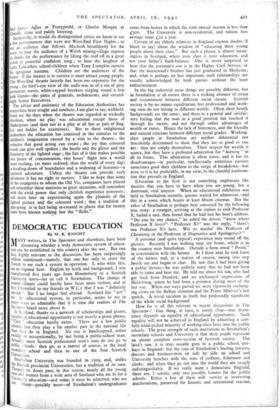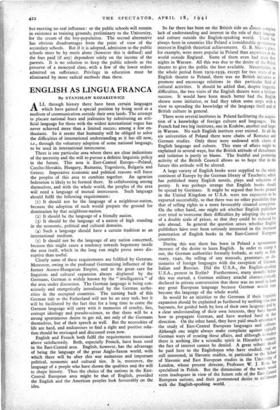DEMOCRATIC EDUCATION
By M. K. KNIGHT
MANY writers, in The Spectator and elsewhere, have been discussing whether a truly democratic system of educa- tion can be established in this country after the war. But one fact, highly relevant to the discussion, has been surprisingly seldom mentioned—namely, that one has only to cross the Tweed to see such a system in operation. I, who write this, am no bigoted Scot. English by birth and background, I was transplanted five years ago from Bloomsbury to a Scottish University town—let us call it Strathalton. The change of mental climate could hardly have been more violent, and at first I bewailed to my friends in W.C.I that I was " definitely abroad." But I no longer feel abroad. Scotland has " got " me. Its educational system, in particular, seems to me in many ways so admirable that it is time the readers of The Spectator heard more about it.
In Scotland, thanks to a network of scholarships and grants, equality of educational opportunity is not merely a pious phrase. Class " education hardly exists. There are a few public schools, but they play a far smaller part in the national life than they do in England. No one is handicapped, either $(2cially or occupationally, by not being a public-school man. Actually, most Scottish professional men's sons do not go to Public schools : they go, as a matter of course, to. the local semadarY school and then to. one of the four Scottish Universt ties.
Strathalton University was founded in 15os, and, unlike English provincial Universities, has a tradition of its own. Tough its doors pass, in due course, nearly all the young !ell and women from a wide area of Scotland who are fit for a University education—and some, it must be admitted, who are isot. Many_possibly, most—of Strathalton's undergraduates come from homes in which the total annual income is less than i300. The University is non-residential, and tuition fees average some izz a year.
Certain of my elderly relatives in England express doubts (I blush to say) about the wisdom of " educating these young people above their class." But such a phrase is almost mean- ingless in Scotland, where your class is your education, and not your father's bank-balance. One is never surprised to hear that the postman's son is in the Higher Civil Service, or that the housemaid's brother has just graduated in Medicine; and, what is perhaps no less important, such relationships are usually acknowledged by both parties without the least embarrassment.
In the big industrial areas things are possibly different, but in Strathalton at all events there is a striking absence of strain and ressentiment between different social classes. Scottish society is by no means equalitarian, but professional and work- ing men do not belong to different worlds. Often their family backgrounds are the same: and there is a general and satisfase- tory feeling that the man in a good position has reached it through his merits, and not through unfair advantages of wealth or status. Hence the lack of bitterness, and the friendly and natural relations between different social grades. Working- class people in Strathalton are neither deferential nor truculently determined to show that they are as good as you are : they are simply themselves. Their respect for wealth is scanty, but they have a profound admiration for " 'aiming " in all its forms. This admiration is often naïve, and it has its disadvantages—in particular, intellectually ambitious parents sometimes goad their children to the verge of breakdown—but even so it is far preferable, in my view, to the cheerful lowbrow- ism that prevails in England.
Education to the Scot is not something unpleasant like measles that you have to have when you are young, but a dominant, vital interest. When an educational exhibition was held in Strathalton'recently, queues waited for admission—and this in a town which boasts at least fifteen cinemas. But the ethos of Strathalton is perhaps best conveyed by the following true story: a stranger, arriving at the station to visit Professor X, hailed a taxi, then found that he had lost his host's address. " Do you by any chance," he asked the driver, " know where Professor X lives?" " Professor X?" was the reply, " there's twa Professor X's here. Wis ye needin' the Professor of Chemistry or the Professor of Dogmatics and Apologetics? "
A personal (and quite typical) experience may round off the picture. Recently I was walking near my home, which is in the country near Strathalton. Outside a farm stood " Postie," in conversation with the farmer. As I drew near he took leave of the farmer and, as a matter of course, swung into step beside me and began to chat. He saw that I had been giving a public lecture—he was politely sorry that he had not been able to come and hear me. He told me about his son, who had got back from Dunkirk, and we exchanged impressions of Heidelberg, where he had been a prisoner during most of the latest war. When our ways parted we were vigorously exchang- ing views on'the Balkan situation and the Prime Minister's last speech. A trivial incident in itself, but profoundly significant of the whole social background.
How far is all this relevant to recent discussions in The Spectator? One thing, at least, is surely clear—true demo- cracy depends on equality of educational opportunity. Such equality will not be achieved in England by admitting a care- fully hand-picked minority of working-class boys into the public schools. The great strength of such institutions as Strathalton's secondary schools and University is that their pupils represent an almost complete cross-section of Scottish society. The laird's son, it is true, usually goes to a public school, per- haps in England: but the sons of Strathalton's leading lawyers, doctors and business-men sit side by side on school and University benches with the sons of crofters, fishermen and clerks: and when they go out into the world they are usually indistinguishable. If we really want a democratic England, there are, I submit, only two possible futures for the public schools. Either a few of them will survive as interesting anachronisms, preserved for historic and sentimental reasons, but exerting no real influence: or the public schools will remain in existence as training grounds, preliminary to the University, for the cream of the boy-population. The second alternative has obvious disadvantages from the point of view of the secondary schools. But if it is adopted, admission to the public schools must be by merit alone (however this is defined) and the fees paid (if any) dependent solely on the income of the parents. It is no solution to keep the public schools as the preserve of a moneyed class, with a few of the lower orders admitted on sufferance. Privilege in education must be eliminated by more radical methods than these.



























 Previous page
Previous page